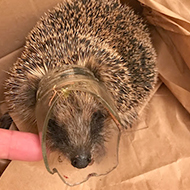
The animal charity has released advice for holidaymakers to prevent incidents.
There is an increased danger to animals as the UK's 'stay-cation' season begins, warns the RSPCA.
The RSPCA is asking the public to be help reduce the risks to animals this summer, after data from the charity reveals that reports of injured and unwell animals double in the summer months.
After higher than last year figures from July suggest that August is also shaping up to be a particularly busy period for the charity, holidaymakers are being urged to reduce the risk to wildlife by behaving sensibly and taking proper precautions.
RSPCA scientific officer Evie Button said: “Nearly 116,000 reports about sick, orphaned and injured animals were made to our emergency line last August (2020) and based on last year’s numbers, we’re expecting this summer to be even busier.”
Several cases have been seen by the charity relating to preventable issues caused by the public, including disturbances by water craft, increased littering affecting animals, barbecues affecting nesting birds on beaches, and livestock being chased by dogs, all of these issues are escalated during the holiday season.
Holidaymakers are being advised by the RSPCA to:
• stay a significant distance from wildlife
• never get close enough to an animal to take selfies or touch them
• keep dogs on leads when instructed to
• dispose of litter responsibly
• only use barbecues in designated areas.
Advice is also being offered by the RSPCA for holidaymakers about things to consider before they even leave your their for a holiday, to ensure that no animals can be needlessly harmed on their property whilst they are away. This advice includes ensuring that sport and garden netting is taken down, shutting the shed door securely, and ensuring that drains are covered, so that no small animal can fall in.
Evie added: “Sadly, thoughtless behaviour, leading to incidents that can disturb, injure or even kill animals increase over the holiday season as more people venture out to make the most of the ending of the coronavirus restrictions.
“But as a nation of animal lovers, it’s so important for us to stop for a moment and think about how our actions can affect animals, and we urge people to follow advice on what they can do to keep animals safe.”



 The Veterinary Medicines Directorate (VMD) is inviting applications from veterinary students to attend a one-week extramural studies (EMS) placement in July 2026.
The Veterinary Medicines Directorate (VMD) is inviting applications from veterinary students to attend a one-week extramural studies (EMS) placement in July 2026.